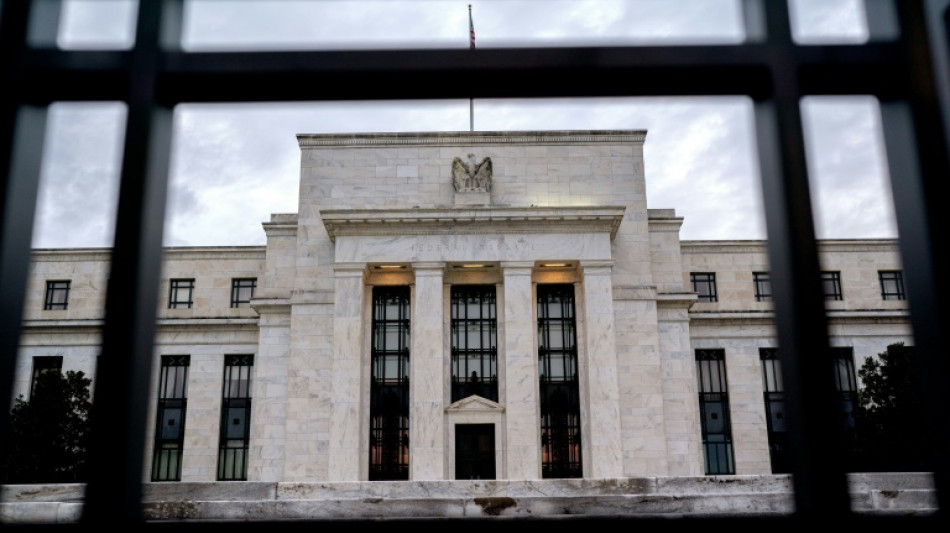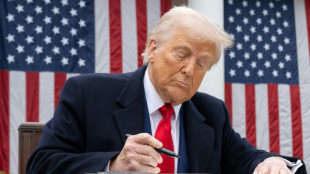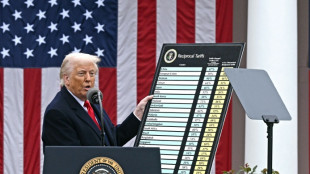
| RBGPF | -0.41% | 67.72 | $ | |
| RIO | -1.89% | 58.79 | $ | |
| GSK | 2.54% | 38.62 | $ | |
| SCS | -5.72% | 10.84 | $ | |
| BTI | 2.84% | 41.425 | $ | |
| AZN | 3.51% | 74.85 | $ | |
| RELX | 0.99% | 51.49 | $ | |
| BCC | -6.19% | 96.12 | $ | |
| NGG | 6.22% | 70.144 | $ | |
| CMSC | -1.58% | 22.15 | $ | |
| JRI | -1.32% | 12.87 | $ | |
| BP | -5.71% | 31.985 | $ | |
| CMSD | -0.95% | 22.615 | $ | |
| BCE | 0.59% | 21.95 | $ | |
| VOD | 2.82% | 9.385 | $ | |
| RYCEF | -0.31% | 9.75 | $ |

US shares reverse course as Fed signals likely March rate hike
Wall Street stocks ended mostly lower Wednesday after Federal Reserve Chair Jerome Powell signaled an interest rate hike is likely in March amid elevated inflation.
Europe's major indices ended the day with strong gains, and US stocks were solidly positive heading into Powell's news conference following the central bank's two-day policy meeting, but then stumbled, with the broad-based S&P falling 0.2 percent.
Meanwhile, the main international oil contract hit $90 a barrel amid continued geopolitical tensions in Ukraine, but later retreated.
In an unusually blunt comment for a central banker, Powell told reporters "the committee is of a mind to raise the federal funds rate at the March meeting."
But he said the recovery in the world's largest economy is strong enough that it can handle higher borrowing costs.
The comments cemented the Fed's policy pivot towards a focus on fighting inflation rather than shoring up the recovery from the Covid-19 crisis, setting up an end to the era of easy money that fueled Wall Street's record-setting run during the pandemic.
Fed officials continue to expect that the wave of rising prices, which hit a multi-decade high in 2021, will ease this year as factors like supply chain struggles, largely caused by the pandemic, begin to resolve.
But economists view the expected March rate hike as the first in a series, while the Fed also laid out plans to begin reducing the stockpile of bonds amassed as it tried to shore up the financial system during the pandemic.
Edward Moya, senior market analyst at OANDA, blamed Wall Street's downturn during the press conference on both fears of balance sheet normalization and on jitters about rate hikes.
"The more Powell talked during the (press conference), the more hawkish he sounded," Moya wrote.
- Oil risk premium -
The standoff on the Ukraine-Russia border continues to trouble markets, with Moscow building up troop numbers and the West led by the United States warning the risk of an invasion "remains imminent" and urging its citizens to leave Ukraine.
The West has threatened to impose severe sanctions on Russia in case it goes forward with an invasion.
Those tensions helped push the price of Brent crude above $90 for the first time since October 2014, though it later fell back.
"The fundamentals (of supply and demand) remain bullish for oil prices and the prospect of a Russian invasion of Ukraine will only increase the risk premium," OANDA analyst Craig Erlam told AFP.
"With the price now above $90 and gathering momentum once more, it may just be a matter of time until it's flirting with $100."
- Key figures around 2230 GMT -
New York - Dow: DOWN 0.4 percent at 34,168.09 (close)
New York - S&P 500: DOWN 0.2 percent at 4,349.93 (close)
New York - Nasdaq: FLAT at 13,542.12 (close)
EURO STOXX 50: UP 2.1 percent at 4,164.60 (close)
London - FTSE 100: UP 1.3 percent at 7,469.78 (close)
Paris - CAC 40: UP 2.1 percent at 6,981.96 (close)
Frankfurt - DAX: UP 2.2 percent at 15,459.39 (close)
Tokyo - Nikkei 225: DOWN 0.4 percent at 27,011.33 (close)
Hong Kong - Hang Seng Index: UP 0.2 percent at 24,289.90 (close)
Shanghai - Composite: UP 0.7 percent at 3,455.67 (close)
Euro/dollar: DOWN at $1.1238 from $1.1305 late Tuesday
Pound/dollar: UP at $1.3458 from $1.3507
Euro/pound: DOWN at 83.45 pence from 83.66 pence
Dollar/yen: UP at 114.64 yen from 113.87 yen
Brent North Sea crude: UP 1.8 percent at $89.76 per barrel
West Texas Intermediate: UP 1.8 percent at $87.15 per barrel
burs/jmb-hs/cs
A.Meyers--LiLuX



